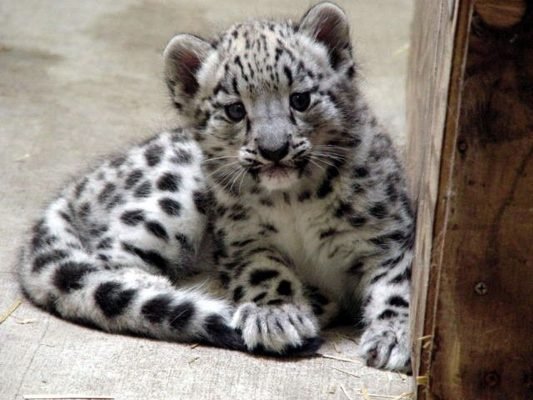Snow Leopard Cubs for sale
$2,500.00
The snow leopard shows several adaptations for living in a cold. mountainous environment. Its small rounded ears help to minimize heat loss. Its broad paws well distribute the bodyweight for walking on snow. and have fur on their undersides. to increase the grip on steep and unstable surfaces. it also helps to minimize heat loss. Its long and flexible tail helps to maintain balance in the rocky terrain. The tail is also very thick due to fat storage. and is very thickly covered with fur. which allows the cat to use it as a blanket to protect its face when asleep. Snow Leopard Cubs for sale
Snow leopard cubs for sale

Snow Leopard Cubs for sale, The generation length of the snow leopard is eight years. The mother gives birth in a rocky den or crevice lined with fur shed from her underside. Litter sizes vary from one to five cubs, but the average is 2.2. Get the snow leopard for sale and the snow leopard cub for sale. baby snow leopard for sale.
Snow leopard cub for sale
Snow Leopard Cubs for sale, A lot of snow leopards share a birthday: From what we can tell so far, snow leopard mating season is in winter and early spring; and almost all wild cubs are born in June or July, turning the mountains of Central Asia into a nursery each summer.
Snow Leopard Cubs for sale, The snow leopard cubs weigh 11.3 – 20.0 oz at birth. They are born blind and helpless. The cubs will open their eyes when they weigh up to 3.96 pounds. At birth their weight is almost equal to an adult alpine marmot.
Baby snow leopard for sale
Snow Leopard Cubs for sale, The snow leopard shows several adaptations for living in a cold. mountainous environment. Its small rounded ears help to minimize heat loss. Its broad paws well distribute the bodyweight for walking on snow. and have fur on their undersides. to increase the grip on steep and unstable surfaces. it also helps to minimize heat loss. Its long and flexible tail helps to maintain balance in the rocky terrain. The tail is also very thick due to fat storage. and is very thickly covered with fur. which allows the cat to use it as a blanket to protect its face when asleep.
snow leopard for sale
Snow Leopard Cubs for sale, In summer, snow leopards usually live above the tree line. on mountainous meadows and in rocky regions at altitudes from. 2,700 to 6,000 m (8,900 to 19,700 ft). In winter, they come down into the forests to altitudes around. 1,200 to 2,000 m (3,900 to 6,600 ft). Snow leopards prefer rocky, broken terrain. and can travel without difficulty in snow up to 85 cm (33 in) deep. although they prefer to use existing trails made by other animals.
We are a breeder of tiger cubs and a wide variety of exotic animals such as cheetah cubs, cougar cubs, jaguar cubs, leopard cubs, black panther cubs, lion cubs, yellow and white Siberian tigers and Buy Exotic pets for sale , leopard and liger (i.e cross breed between lion and tiger) all ready for sale at
very affordable prices. Buy Exotic Pets , they are well trained, vaccinated, health guaranteed etc, Big cat for sale Tiger cubs are born blind and are completely dependent on their mother. Newborn tiger cubs weigh between 785 and 1,610 grams (1.75 to 3.5 lb). The tiger cubs’ eyes will open sometime between six to twelve days. However, they do not have their full vision for a couple of weeks.
Snow Leopard Cubs for sale, All our tiger cubs are bottle-fed and raised in our home as home pets, so they are perfectly socialized and will make very good pets.
We sell each cub with complete health papers from and approved vet., breeders guide manual and a 1 year health guarantee.
We ship these tiger cubs for sale, across certain continents (depending on exotic trade law). Due to the amount of work required to handle an animal of this calibre, we will only sell to customers who can properly care for these tigers. Tigers are no cheap pet. Unlike dogs and cats which can be looked after on a budget, these powerful felines require constant caring, with food costs being high, as well as future vet costs if needed.















Reviews
There are no reviews yet.